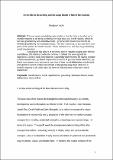Files in this item
Direct moral grounding and the legal model of moral normativity
Item metadata
| dc.contributor.author | Sachs, Benjamin Alan | |
| dc.date.accessioned | 2016-04-29T23:32:11Z | |
| dc.date.available | 2016-04-29T23:32:11Z | |
| dc.date.issued | 2015-04 | |
| dc.identifier | 165917098 | |
| dc.identifier | da7fea2b-1cee-49d9-b6e2-fc8b5fcf8e04 | |
| dc.identifier | 84938423071 | |
| dc.identifier | 000358782500004 | |
| dc.identifier.citation | Sachs , B A 2015 , ' Direct moral grounding and the legal model of moral normativity ' , Ethical Theory and Moral Practice , vol. 18 , no. 4 , pp. 703 - 716 . https://doi.org/10.1007/s10677-015-9598-0 | en |
| dc.identifier.issn | 1386-2820 | |
| dc.identifier.other | ORCID: /0000-0002-2307-7620/work/69029288 | |
| dc.identifier.uri | https://hdl.handle.net/10023/8708 | |
| dc.description | Date of acceptance: 05/04/2015 | en |
| dc.description.abstract | Whereas most moral philosophers believe that the facts as to what we’re morally required to do are grounded by the facts about our moral reasons, which in turn are grounded by non-normative facts, I propose that moral requirements are directly grounded by non-normative facts. This isn’t, however, to say that there is no place in the picture for moral reasons. Moral reasons exist, and they’re grounded by moral requirements. Arguing for this picture of the moral sphere requires playing both offense and defense; this article provides the defense. I defend this view against the objections (1) that it must deny that one is generally blameworthy for having violated a moral requirement, (2) that it implies the existence of genuine moral dilemmas, (3) that it runs counter to an obviously true view of how moral deliberation should work, and (4) that it cannot explain why it feels as though figuring about what one is morally required to do often takes the form of thinking about what one’s moral reasons are. | |
| dc.format.extent | 233798 | |
| dc.language.iso | eng | |
| dc.relation.ispartof | Ethical Theory and Moral Practice | en |
| dc.subject | Moral reasons | en |
| dc.subject | Moral requirements | en |
| dc.subject | Grounding | en |
| dc.subject | Blameworthiness | en |
| dc.subject | Moral deliberation | en |
| dc.subject | Reasons-first | en |
| dc.subject | B Philosophy (General) | en |
| dc.subject.lcc | B1 | en |
| dc.title | Direct moral grounding and the legal model of moral normativity | en |
| dc.type | Journal article | en |
| dc.contributor.institution | University of St Andrews. Philosophy | en |
| dc.contributor.institution | University of St Andrews. Institute of Legal and Constitutional Research | en |
| dc.identifier.doi | 10.1007/s10677-015-9598-0 | |
| dc.description.status | Peer reviewed | en |
| dc.date.embargoedUntil | 2016-04-30 |
This item appears in the following Collection(s)
Items in the St Andrews Research Repository are protected by copyright, with all rights reserved, unless otherwise indicated.

